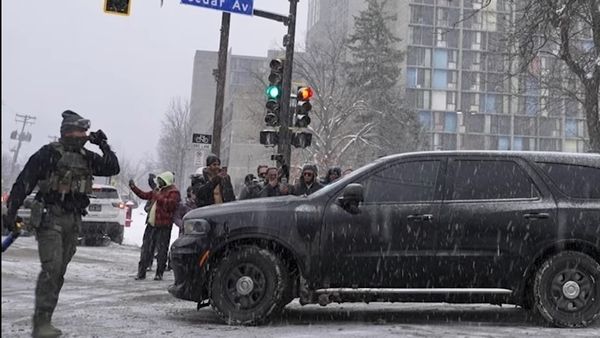
On Thursday after question time, Anthony Albanese gave an end-of-year speech thanking his colleagues and opponents, although at times it was difficult to tell which was which.
Turning to the crossbench, the prime minister spoke about the importance of respect in politics but couldn’t help himself when it came to an obligatory reference to the “Greens political party”.
Respectful but fiercely competitive, Albanese is a Labor man who has shown himself to be as adept – or perhaps more so – at fighting Greenies as he is at fighting Tories.
But after a year of quarrelling, the parties of the left have made up, and the Greens granted most of Albanese’s Christmas wishes. Of the 31 government bills passed in the frenetic final day, 27 were passed through the Greens and Senate crossbench, and just four with the Coalition.
“The outcomes that have been achieved today in the Senate are a direct result of having respectful dialogue and making a difference,” Albanese said.
The Greens have adopted a much more conciliatory posture this fortnight, agreeing to pass both Labor housing bills and making substantial concessions on nature laws as well.
On housing, the minor party was humiliated. But Future Made in Australia and Labor’s search for support for the rest of its legislative shopping list helped the Greens gain a little leverage and save face with a deal on Thursday.
They won limits on investments in fossil fuels and $500m for energy upgrades in social housing, although one wonders whether Labor would have done so in the mid-year economic update anyway.
It was ironic that after months of warnings about a major party stitch-up, one of the few bills Labor couldn’t get over the line was a bipartisan deal on its electoral spending and donation caps.
The special minister of state, Don Farrell, did not do enough to keep the crossbench pathway alive, giving the Coalition too much leverage to demand changes on donation limits and disclosure thresholds. Farrell will have the whole summer to finish the job.
The other bills not progressing were more the victim of Labor internals than failures of negotiations. Albanese nixed a deal between Tanya Plibersek and Sarah Hanson-Young on environment laws to avoid upsetting Western Australian interests.
Jim Chalmer’s bill to reduce tax concessions on super accounts with more than $3m was put in the “don’t rush it” basket at the prime minister’s request.
The Coalition had largely dealt themselves out, opposing everything from anti-money laundering measures to governance changes at the Reserve Bank of Australia. After they voted down the power to cap international student numbers, Labor couldn’t really rely on them.
The bills passing with Coalition support were the sort of thing they would have done in government anyway, like banning under-16s from social media, although a few Liberal and National backbenchers had expressed their concerns about overreach.
The trio of immigration bills were in many respects worse than the Coalition attempted in government. Sure, there were more safeguards on banning phones in detention. But I don’t ever remember the Coalition imposing criminal penalties for non-citizens refusing to cooperate with deportation, banning visa applications from whole countries, or authorising deals to pay third countries to take our non-citizens.
All of that is law now, thanks to Labor and the massive overreaction to a string of high court losses on the legality of indefinite detention in November 2023 and punitive visa conditions in November 2024.
This week, and particularly Thursday’s bill flurry, has done a lot to cement the Albanese government’s first-term agenda.
If it loses the 2025 election it will be because the cost of living has not decreased fast enough, not because it failed to deliver on its 2022 promises.
In that same end of year speech, Albanese recalled the 17 days and 17 minutes Rob Oakeshott made the country wait before declaring he would back Labor to form government in 2010.
Although Albanese vowed in caucus on Tuesday to leave nothing on the field when it comes to securing a second majority Labor government, he seemed cognisant on Thursday that might not be possible.
He turned to the crossbench and remarked, “There’s a lot of you up there, I’ve got to say.
“During the period 2007 to 2010, I engaged with all the crossbench and treated them with respect when we didn’t need their vote.
“We then did need their vote after the 2010 election. I just believe in treating people in the parliament with respect.”
This week Albanese and Labor have shown that they can deal for their legislative agenda. They are hoping that the 2025 election won’t see them dealing for the continued life of their government.
Paul Karp is Guardian Australia’s chief political correspondent







